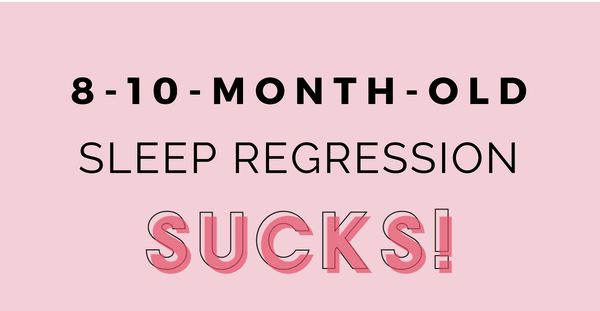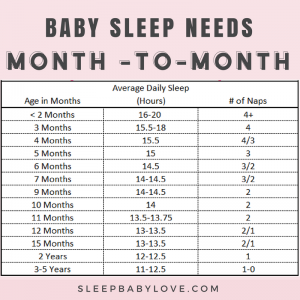Sleep Regression Ages: 8-10 Months Really Sucks!
are sleep regression ages important?
Most definitely! We’ve been covering the hot topic of baby sleep regressions heavily on the blog, as this is a common but frustrating issue all parents must face at one point or another. When it comes to your babies development and growth, sleep regression ages can make a big difference.
Essentially when your babe hits 8, 9 or even 10 months of age, he or she will experience a temporary sleep disturbance.
Again.
I say again; because this is just one of a few age-related sleep regressions. According to The Sleep Lady, your child could go through a 4-month, 7-month, 9-month, 12-month, 15-month, 18-month and even a 3-year-old regression.
Each of the sleep regression ages is slightly different than the other but the common thread is that these sleep regressions are due to growth and development.
You may be the lucky one so, keep in mind your child may or may not go through a regression at all. Each child can experience sleep regressions at different stages than others.
Sleep regression ages (8-10-month-old) common issues include:
-
- waking in the middle of the night
-
- waking up shortly after being put to bed (also known as the 40-minute intruder)
-
- restless sleep
-
- fussiness or crankiness before falling asleep
-
- wanting to sleep with mommy/daddy
-
- shorter than usual naps
-
- not wanting to nap at all
-
- fussing at naptime
-
- hungry after waking
- irritable upon waking up
If your child is experiencing any of these signs, he or she might be in the middle of the 8-10 month sleep regression.
And yes! Mommas – we know this sucks!
How Long Does A Sleep Regression Last?
There’s good news though, and that good news is that within all sleep regression ages, the regression is temporary.
Just a 1 to 6-week phase that will get better. Yes! Even a week or two with unbalanced sleep can wreak havoc on anyone – but with a few minor tweaks here and there to your baby’s sleep schedule; you’ll both be snoozing gain in no time.
What Developmental Changes Happen Around 8 Months?
Basically, your baby is growing so fast, that she can’t keep up with the myriad of changes both physical and mental that she’s experiencing. And there are a lot of changes that are happening such as:
- Learning Language
- Crawling
- Scooting
- Standing
- Rolling
All this makes for a tired baby but also an over-stimulated baby. And what temporarily suffers is… sleepy time. Your baby wants to sleep, but she’s got a lot on her plate and mind.
Object Permanence Plays A Part
Another huge change with your baby is object permanence – which is the ability for your baby to know when things are there (or not there) even when not in plain sight. So your baby might have been able to allow you to put him down asleep while rocking and now he screams bloody murder the second he realizes that you’re not there.
It’s brutal when things with sleep used to be good and now not so much.
How can you Get Your Baby Through the 8-10-Month-Old Regression?
You can help your baby through this temporary sleep issue in a few different ways.
By providing plenty of support and helping your baby through this busy time in her life; she’ll adapt quickly to the many changes before her. And bad sleep will be history.
-
- Environment – during this sleep regression, your baby is experiencing a lot. Lots of milestones here; from language learning to physical changes like crawling and standing. This is a lot for a baby and as such, one thing you can do to help – is by taking anything that can be considered distracting and something else to think about. Keep her room as minimalistic as possible with no bright lights, flashy toys, wacky wallpapers or even bedding. Try to keep her sleeping space dimly lit and quiet. The fewer distractions, the better, especially to stay safe while sleeping.
- Environment – during this sleep regression, your baby is experiencing a lot. Lots of milestones here; from language learning to physical changes like crawling and standing. This is a lot for a baby and as such, one thing you can do to help – is by taking anything that can be considered distracting and something else to think about. Keep her room as minimalistic as possible with no bright lights, flashy toys, wacky wallpapers or even bedding. Try to keep her sleeping space dimly lit and quiet. The fewer distractions, the better, especially to stay safe while sleeping.
-
- Awake Hours Are Meant for Plenty of Activity – during hours where your babe is awake is the ideal time to keep her engaged and busy with activity. This is the time where your babe can and should practice his newly discovered moves. From crawling, scooting, pushing, grabbing, standing, sitting, etc. Let them practice these new movements during the day so they won’t practice them at bedtime. Or at naptime.
-
- Bedtime Routine: Your baby is now older and can start piecing together the order of things, so make sure that you have a bedtime and naptime routine in place so your baby knows what to expect and can be used to being put down to go to SLEEP!
-
- Less Napping, More Nighttime Sleep – typically at the 8-month to 10-month mark is when many babies are weaned off the 3rd daily nap. This change alone is one that can trigger minor sleep disturbances for your little one since the stretch between bedtime is pretty long if your baby was used to taking a cat-nap. Best way to cope with this issue is to make night bedtime a bit earlier – no more than 4 hours maximum from the last nap. See how this helps or not. The only to know for sure is to try it.
-
- Adjust Routine/Schedules Accordingly – every family is different with various schedules and routines. Play around with wake up and bedtimes to focus on the amount of total hours baby should be sleeping. Try an hour earlier, an hour later, half an hour, etc. Eventually, one will work out and net your babe and your family some quality sleep. The key is to keep your baby well-rested and put your baby down before she gets over-tired.
-
- Be Realistic – Does Your Baby Have Independent Skills? I know, I know… it’s so much easier if we can blame something like a baby sleep regression (or even wonder weeks or teething) on our sleep woes, but it’s time to be honest if your baby doesn’t know how to fall asleep independently – she can’t stay asleep independently, which will result in too many night wakings or short naps. —>>Teaching independent skills is a big topic on its own – so no worries, I got you covered with this super detailed article: Sleep Training Made Easy: The Ultimate Guide
As you can see, there are a few things you can do to help your baby through this and all sleep regression ages. Keep in mind your baby’s age, what milestone he or she is currently in or about to go through and provide the necessary support. Like you’ve always done.
Sleep regressions will come and go. All of them. Yes! Even this one; the 8-10 month-old regression.
How to Survive all sleep regressions ages?
All baby sleep regressions have one thing in common. Most, if not all – are temporary. This is good news, right?
Yes, it is. Basically, each one is about a certain age-related development in your baby’s growth. As he or she ages and goes through certain physical and mental phases, her sleeping habits will take a minor hit.
And yes! This is and will be quite frustrating for both your babe and for you. You will both lose out on some sleep. But the bright side is that your baby is growing up and is exhibiting very normal growth behavior. Frustrating, but normal.
To survive any sleep regression, you should or can:
-
- Take note of age – first thing to always consider when you think your baby might be experiencing a sleep regression is to take note of age. This will help you to know what’s in store, why your baby is not sleeping as expected and also and most importantly how best to handle it.
-
- Take note of the development stage – as you think of age next step is to think of the development stage. Each age will bring about different changes, both physically and mentally. Once you know what exactly your babe is experiencing, you’ll be able to determine the best course of action. Whether to add a nap, take away a nap, increase/decrease nap times schedule, adopt an earlier or later bedtime, etc. These small changes can and will make a big difference – as you will see and experience with each sleep regression.
-
- Focus on support, as opposed to major changes – one thing we see again and again is parents making big or permanent changes to their sleep routines when depending on the regression; it might not be necessary. And could potentially do more harm than good. Instead of major radical changes, try just a bit of support. Meaning your child will need a bit of help with physical, developmental changes such as sitting, standing, holding, etc. And with mental changes such as the understanding and meaning of words. Including the coveted “mama” and “papa.” These are the subtle but important things any parent can do to help ease the transition of growth.
- Prepare for the next one – and last but not least. You can make the next (or final) age-related sleep regression a minor one by preparing. Learn what you can (as you’re doing right now) by reading our blog. And finding ways, tips, and ideas to minimize the sleep discomfort for your babe. 🙂 Since each sleep regression is different with different solutions; reading and learning what you can about each will only help you. And your babe. The 4-month sleep regression is way different than the 2-year-old regression; so you have to plan accordingly. Preparing for each will net you what you seek: sleep!!!
Whether this is your first child or third, you got this. You can handle this (and any) sleep regression. With awareness and preparation, you’re halfway through it. Ok. More than halfway; you’re so there.
Most sleep regressions last only a few weeks, keep this in mind. We get it. Right now your baby is not sleeping, or partially sleeping or not wanting to nap, etc. We get it. We’ve been there. It’s frustrating. We hear you.
But we also know there’s help for you. This is what I do check out my other sleep resources or book a consultation so we can finally get sleep back on track. You’ll be so happy once you do!
Share below if your baby went through the 8-10 month sleep regression? Any tried and true tips to share to provide hope for the other parents on the blog?



